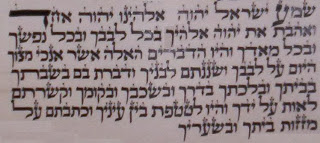This fellow was perhaps best-described as a human jumping
bean, or perhaps as a good soldier (see picture here)
 who went willingly where
he felt he was being directed. He marched from one vocation to another,
broadening and deepening his unique experience while maintaining a connection
to God. Russell Kelso Carter had anchored himself to the Divine, apparently, by
the time he composed the hymn “Standing on the Promises” in the mid-to-late 19th Century. Could his words have also been a portent of things to come in his
life, or did the words reflect something that was already ongoing? Perhaps it
was both.
who went willingly where
he felt he was being directed. He marched from one vocation to another,
broadening and deepening his unique experience while maintaining a connection
to God. Russell Kelso Carter had anchored himself to the Divine, apparently, by
the time he composed the hymn “Standing on the Promises” in the mid-to-late 19th Century. Could his words have also been a portent of things to come in his
life, or did the words reflect something that was already ongoing? Perhaps it
was both.
R. Kelso Carter was already diversifying his life by the
time he graduated from school and began working in the late 1860’s, a blueprint
he added to for the next 50 years. He’d been a standout athlete at the
Pennsylvania Military Academy as a student, and later was professor of various
subjects (Mathematics, Chemistry, Civil Engineering, and Natural Science) immediately
thereafter. He jumped from there to sheep-herding in California, a period
during which a heart condition crystallized something in his spirit, as he felt
he was near death. He prayed for healing while trying to convalesce in
Baltimore, and it may have been there that he really began to ‘stand on’ God’s promises
as a 30-year old. He later became a Methodist minister, while continuing to
involve himself in writing and publishing hymnals, novels, and textbooks in the
sciences he had taught in Pennsylvania. Later, he studied medicine and became a
physician in Baltimore, a profession he continued until his death in 1928. But,
the principle he’d learned while healing from a weak heart was apparently something
he never forgot – that all he needed was what God had already assured him could
be his. He vowed to use himself for Him from that healing point forward. Was it
an accident that Carter was able to do a variety of things well until he left
his earthly life at 79 years old? He was a vivid example of loyalty to the God
whose promises he trusted.
Carter’s hymn words for each verse begin with ‘Standing on
the Promises’, a repetition that some have suggested was a reflection of the
composer’s military education. ‘Don’t doubt’, you can sense Carter commanding.
He’s not a God who’ll waffle. Just attach yourself to Him, and take in this
part of His character as an integral element of your own makeup. Russell Carter
joined this army willingly, and look at all that he was empowered to do. The
hymn’s pace has a martial quality, but His is an all-volunteer army – no conscripts
here. If I use Him as my foundation – not unlike a bass drum, hammering out a
consistent beat – my life has certainty, though it might take turns others
resist. Are you ready to be a soldier?
Information on the song’s composer was obtained from the
books “Amazing Grace – 366 Inspiring Hymn
Stories for Daily Devotions”, by Kenneth W. Osbeck, Kregel Publications, 1990; “101
More Hymn Stories”, by Kenneth Osbeck, Kregel Publications, 1985; “The Complete
Book of Hymns – Inspiring Stories About 600 Hymns and Praise Songs”, by William
J. and Ardythe Petersen, Tyndale House Publishers, 2006; and “Then Sings My
Soul”, by Robert J. Morgan, Thomas Nelson, Inc., 2003.
The hymn’s story is found here: http://www.sharefaith.com/guide/Christian-Music/hymns-the-songs-and-the-stories/standing-on-the-promises-the-song-and-the-story.html




